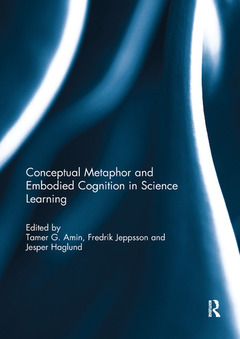Conceptual metaphor and embodied cognition in science learning
Coordonnateurs : Amin Tamer, Jeppsson Fredrik, Haglund Jesper

Scientific concepts are abstract human constructions, invented to make sense of complex natural phenomena. Scientists use specialised languages, diagrams, and mathematical representations of various kinds to convey these abstract constructions. This book uses the perspectives of embodied cognition and conceptual metaphor to explore how learners make sense of these concepts. That is, it is assumed that human cognition ? including scientific cognition ? is grounded in the body and in the material and social contexts in which it is embedded. Understanding abstract concepts is therefore grounded, via metaphor, in knowledge derived from sensory and motor experiences arising from interaction with the physical world.
The volume consists of nine chapters that examine a number of intertwined themes: how systematic metaphorical mappings are implicit in scientific language, diagrams, mathematical representations, and the gestures used by scientists; how scientific modelling relies fundamentally on metaphor and can be seen as a form of narrative cognition; how implicit metaphors can be the sources of learner misconceptions; how conceptual change and the acquisition of scientific expertise involve learning to coordinate the use of multiple implicit metaphors; and how effective instruction can build on recognising the embodied nature of scientific cognition and the role of metaphor in scientific thought and learning. The volume also includes three extended commentaries from leading researchers in the fields of cognitive linguistics, the learning sciences, and science education, in which they reflect on theoretical, methodological and pedagogical issues raised in the book. This book was originally published as a special issue of the International Journal of Science Education.
Introduction: Conceptual Metaphor and Embodied Cognition in Science Learning1. The Importance of Language in Students’ Reasoning About Heat in Thermodynamic Processes2. Varying Use of Conceptual Metaphors across Levels of Expertise in Thermodynamics3. On Conceptual Metaphor and the Flora and Fauna of Mind: Commentary on Brookes and Etkina; and Jeppsson, Haglund and Amin4. Applying Conceptual Blending to Model Coordinated Use of Multiple Ontological Metaphors5. Enacting Conceptual Metaphor through Blending: Learning activities embodying the substance metaphor for energy6. Some Challenges in the Empirical Investigation of Conceptual Mappings and Embodied Cognition in Science Education: Commentary on Dreyfus, Gupta and Redish; and Close and Scherr7. An Analysis of Metaphors Used by Students to Describe Energy in an Interdisciplinary General Science Course8. Understanding Starts in the Mesocosm: Conceptual metaphor as a framework for external representations in science teaching9. From Stories to Scientific Models and Back: Narrative framing in modern macroscopic physics10. On the Significance of Conceptual Metaphors in Teaching and Learning Science: Commentary on Lancor; Niebert and Gropengiesser; and Fuchs11. Conceptual Metaphor and the Study of Conceptual Change: Research synthesis and future directions
Tamer Amin is Associate Professor and Director of the Science and Mathematics Education Center in the Department of Education at the American University of Beirut, Lebanon. His research focuses on the development of scientific understanding and reasoning, with a particular emphasis on how language relates to this process. He is currently co-editing (with Olivia Levrini) a forthcoming Routledge publication entitled Converging Perspectives on Conceptual Change: Mapping an Emerging Paradigm in the Learning Sciences.
Fredrik Jeppsson is Assistant Professor in the Department of Social and Welfare Studies at Linköping University, Sweden. His research focuses on the teaching and learning of thermal science at different age levels. He has an interest in embodied cognition and, in particular, how metaphorical language can support students’ learning. He currently studies how primary students’ meaning-making of science content can be promoted by mediation through different semiotic modes (e.g. verbal language, body language, images, or models).
Jesper Haglund is a Postdoctoral Researcher and Docent in Physics with Specialization in Physics Education at the Department of Physics and Astronomy, Uppsala University, Sweden. His research focuses on the teaching and learning of thermal science at different age levels. He has a particular interest in embodied cognition and how analogies and metaphors can support students’ learning. Recently, his study has focused on how infrared cameras can be used in open-ended laboratory activities.
Date de parution : 10-2018
17.4x24.6 cm
Date de parution : 12-2016
17.4x24.6 cm
Thèmes de Conceptual metaphor and embodied cognition in science... :
Mots-clés :
Conceptual Metaphor; Conceptual Metaphor Theory; International Journal of Science Education; Conceptual Blending; abstract constructions; Source Domain; Propositional Representations; embodied cognition; Image Schemas; scientific concepts; Input Space; scientific language; Energy Conservation; scientific learning; Ontological Metaphors; technical diagrams; Conceptual Change; thermodynamics; Vital Relations; VERTICAL LOCATION; Embodied Cognition Perspective; Conceptual Blending Theory; Science Education; Energy Theater; Embodied Conceptions; External Representations; Image Schematic Structure; Undergraduate Students; Blended Space; Source Path Goal Schema; Signal Conduction; Scientific Problem Solving; Mesocosmic Experience



